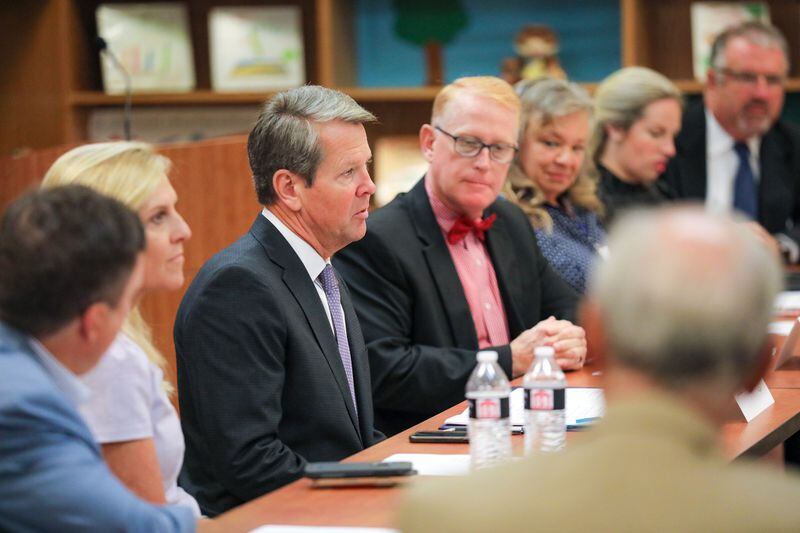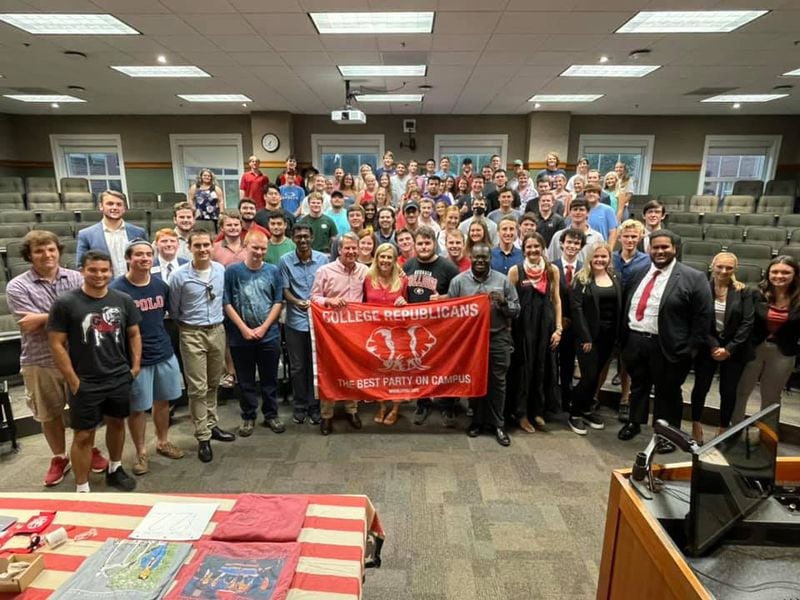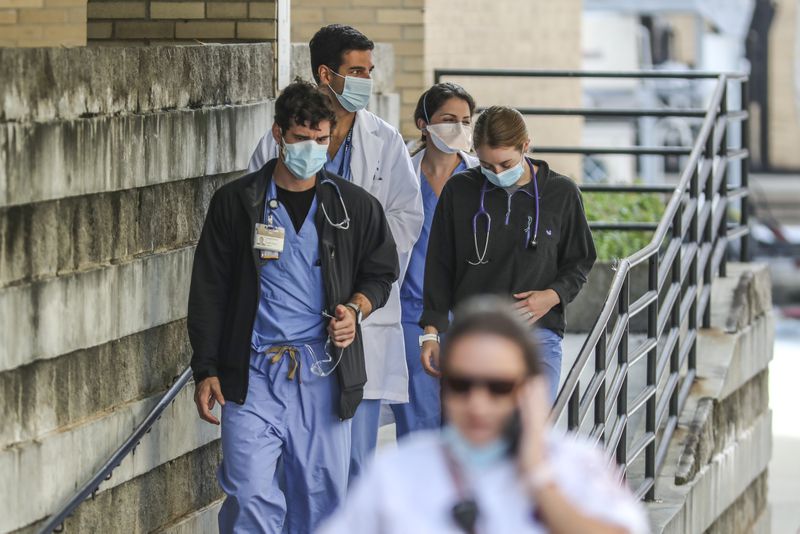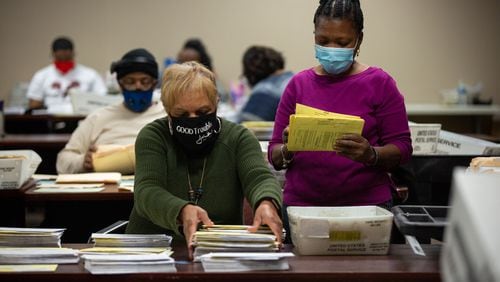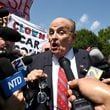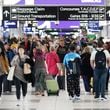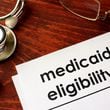Georgia parents were teetering between hope and anxiety in early August as children were returning to classrooms. COVID cases and hospitalizations were rising again after a mid-summer lull, and the CDC had just called for everyone in places like Georgia, with high disease transmission, to go back to wearing masks indoors.
Gov. Brian Kemp didn’t echo that call. When he went on national television to talk about the new school year, he spoke of masks as tools of government overreach, accusing the CDC of doublespeak. We don’t need mandates to know what to do, he said on Fox and Friends. His refrain there and at press conferences: We need to trust people to do the right thing.
In the days following, Kemp told Georgians to follow scientific guidance. But he also said it was up to every individual whether to wear masks or get vaccinated. Later, he gave state government workers the Friday off before Labor Day so that any who were unvaccinated could — if they so desired — schedule their shots.
On Aug. 19, as COVID hospitalizations topped 5,000 and doctors from Atlanta’s major hospitals begged people to get vaccinated, Kemp signed an order allowing businesses to ignore any local COVID restrictions. Four days later, as another 500 patients filled hospitals, Kemp said he hoped more Georgians would “become comfortable getting vaccinated.”
But the state’s vaccination rate barely budged as hospitalizations and infections in classrooms continued to soar during the pandemic’s lethal fourth wave.
It’s been a milquetoast approach, public health advocates say, and one that’s led to the worst health crisis in the state’s history. Kemp hasn’t taken aggressive measures to stem the spread of disease, instead taking piecemeal steps to help hospitals cope with the horrific consequences.
It wasn’t until intensive care units filled with COVID-19 patients, and the death toll was skyrocketing toward 20,000, that the governor did more to try to boost vaccinations. To encourage state government employees and retirees to consider getting the shots, he added incentives of a $150 Visa gift card or $480 in credits for health care expenses. State officials said they don’t know, though, how many state workers are unvaccinated, and public records requests to state agencies revealed no documents on those rates.
While Kemp is resistant to mandates, critics say he has other options to tackle the virus’ spread head-on. He could offer incentives to younger people to get vaccinated and vastly expand mobile clinics. At the least, he could barnstorm the state to shed light on the tragedies unfolding in hospitals. He also could use his bully pulpit to dispel misinformation and make clear what Georgians need to do to save lives.
“It’s not an enthusiastic endorsement that says, ‘God, please, get vaccinated. Save your children. Save your own life,’” said Mark Rosenberg, who spent 20 years as a researcher for the Centers for Disease Control and Prevention and 16 years as president and CEO of the Task Force for Global Health.
“Brutal honesty” is essential in times of crisis, along with “credible hope,” said Nancy Koehn, a professor of business administration at the Harvard Business School and author of “Forged in Crisis: The Power of Courageous Leadership in Turbulent Times.”
“This is one of the first times in modern American history where we have a group of elected officials willing to put political chips down on a particular poker table, when those political chips are the lives of their constituents,” Koehn said.
Credit: WSBTV Videos
Some of the most forceful comments Kemp made about vaccination came on Aug. 30, as a record number of COVID-19 hospitalizations had pushed health care systems to the brink of collapse. At a news conference, the governor announced that he would deploy 2,500 National Guard personnel to help hospitals, nursing homes and testing sites, adding to the 105 previously deployed. Earlier in the month, he also announced that he would increase state-supported hospital staff by 1,500.
At that conference, Kemp called vaccines a medical miracle. But he also said mandates would only breed distrust and reiterated that it was up to each Georgian to decide whether to get the shots.
Asked by a reporter if he was doing enough to stem the spread of the highly infectious delta variant, the governor said he didn’t see other possibilities.
“If you have any good ideas on how we can further slow the spread, I’d be open to it,” Kemp immediately shot back.
Meanwhile, following Kemp’s position on mandates, the University System of Georgia refused to require masks or vaccines. And when President Joe Biden said he would require vaccines or regular testing for employees of all private sector companies of 100 of more workers, Kemp called it unlawful overreach and said he would fight Biden in court.
Shunning the guidance
The CDC called for everyone in high-transmission areas to wear masks indoors, and outdoors amid crowds, after new research found that vaccinated people could become infected with the delta virus and spread it themselves. It was a switch from earlier guidance, as delta proved more difficult to stop.
Yet as students returned to class at Ball Ground Elementary School on Aug. 6, Kemp was there to celebrate, maskless. The governor tweeted a photo showing him sitting at a crowded table of officials. Not one person wore a mask.
Credit: Special
Credit: Special
The next day, Kemp spoke at a GOP rally in Rome attended by hundreds, with nary a mask in sight. Another speaker was U.S. Rep. Marjorie Taylor Greene, who warned the cheering crowd against efforts by the government and private companies to require vaccinations.
Floyd County medical officials set up a vaccination tent at the event, though not a soul signed up to get the shots.
Two days later, Kemp was in Wayne County at business and GOP events; in late August, at the University of Georgia with a large group of College Republicans; then in a cavernous building at the state fairgrounds in Perry with activists and other elected officials; and in early September, in Dawson County, speaking to business leaders.
Credit: Special
Credit: Special
At each event, photos posted online showed few masks, if any, making for a contradictory message about following scientific guidance.
According to spokesman Cody Hall, the governor quit wearing masks earlier this year after he was fully vaccinated and hasn’t gone back to wearing them since the CDC guidance changed. (He does wear them in facilities that require or request it, though.)
Hall said the governor wants to promote vaccines by showing people you don’t have to wear a mask once you’re inoculated.
It’s a position that pleases Kemp’s political base.
Mickey Tuck, a longtime Republican activist who attended the Rome rally, said he wasn’t concerned by the lack of masks. “I have felt completely safe at all rallies,” he said. “Each person and each community needs to do what they feel is necessary for them.”
Others, though, see it as a failure to lead by example, as the debate on masks has roiled public schools, pitting parents against parents and against school boards. Clashes over the issue happened twice last month in demonstrations in the parking lot of Cobb County Schools’ headquarters.
By Sept. 4, the 14 Metro Atlanta school districts reported 24,507 confirmed cases of COVID-19, prompting some schools to return to virtual learning, sometimes impacting whole grade levels or an entire school building. Each district operates with its own criteria in making those decisions, and the reasoning is often confusing to parents, students and staff.
With masks optional in her daughter’s Cobb elementary school, Karen Rippeon checks her out at lunchtime every day so she can eat in the car instead of the cafeteria, where masks come off without any social distancing.
“Everyone wants to talk about choice,” Rippeon said. “Well look, my 10-year-old doesn’t have a choice. But you are putting her in the exact same environment that you are putting other kids into that have a choice. So you’re not really talking about the same choice here.”
Adding to the uncertainty, the state doesn’t provide weekly statistics on hospitalizations among children, just the ongoing cumulative since the pandemic began. Amber Schmidtke, a health care data researcher who blogs about the crisis in Georgia, extracts the weekly numbers by logging the totals every Friday.
“Georgians shouldn’t have to depend on me for that,” she said. “They’re paying for that data to be displayed in a useful way, and it’s not right now.”
Pandemic politics
The crisis in modern history has come at a precarious time for the governor, who faces a Republican primary next year ahead of a tough general election in one of the nation’s most politically competitive states.
The key topics he has hammered at in his appearances throughout the state, in social media posts and press releases have focused on the economy, the rewrite of Georgia’s election law, Atlanta crime and, increasingly, his resistance to vaccine mandates.
Even as Democrats pummel him for not taking more aggressive action against COVID, far-right conservatives want him to go the other direction, pressing him to ban private companies from requiring vaccines and schools from mandating masks.
Kemp can’t afford to rankle his base, given that he incurred the wrath of former President Donald Trump this year for his resistance to overturning election results.
Credit: JOHN SPINK / AJC
Credit: JOHN SPINK / AJC
Critics say this dynamic puts Georgia at a disadvantage. Kemp fears antagonizing his base, they say, while the health care field fears antagonizing Kemp. One hospital CEO who provided data for this story, after learning it would focus on Kemp’s pandemic performance, asked not to be quoted in it or have the hospital named.
Kemp’s office is quick to color any criticism of his approach as an attempt to “play pandemic politics” and force another lockdown.
“Governor Kemp will remain focused on taking common sense steps to protect Georgia businesses, encourage vaccination, keep kids in schools, and ensure our hospitals and health care workers have the resources they need to deliver care to Georgians in need,” his office said.
Eva Lee, an expert in vaccine distribution and director of the Georgia Center for Operations Research in Medicine and Healthcare, said the governor cares a great deal about his political future and core Republican supporters. “But on the other hand, whatever positive steps he’s doing, we don’t want to criticize him, either,” she said.
The steps, though, aren’t preventing the tragedies playing out day to day in Georgia hospitals.
As of early September, Georgia had managed to place about 1,400 temporary medical staff at 71 hospitals, according to the Department of Community Health.
But there were three times that number of vacant nursing positions in Georgia on Monday — more than 4,400, including 783 vacancies in intensive care, according to the nursing job service Vivian Health.
Checks of some of the hospitals receiving assistance from the National Guard deployments found that, while administrators expressed deep gratitude to the governor, the extra hands aren’t nearly enough to relieve front-line workers from the daily horrors of disease, death and burnout.
The guard members, if they have medical credentials, are mostly medics. While they can fill some gaps, few can function as intensive care nurses or respiratory therapists — the positions hospitals say they need most.
Northeast Georgia Health System had 45 guard members working at its Gainesville and Braselton hospitals on Monday, a spokesperson said. Dr. John Delzell, vice president and incident commander, estimated the hospitals are “several hundred” short on nurses and other positions.
Delzell said that what the hospitals could use more than extra staff, though, is to get vaccination numbers up.
“We wouldn’t need all these resources if we could get 75%, 80% of the state to be vaccinated,” he said. “Because 85% or so of the people that we’re seeing, and 95% of the people that we’re seeing in the ICUs, are people that are unvaccinated.”
Rosenberg, formerly of the Task Force for Global Health, said Kemp needs to abandon his previous position and make the tough calls. “He has got to give it up and lead,” he said.
“The number of voters who don’t care whether their kids live or die, those voters are very, very small,” Rosenberg said.
Staff Writer Bill Rankin contributed to this article.
